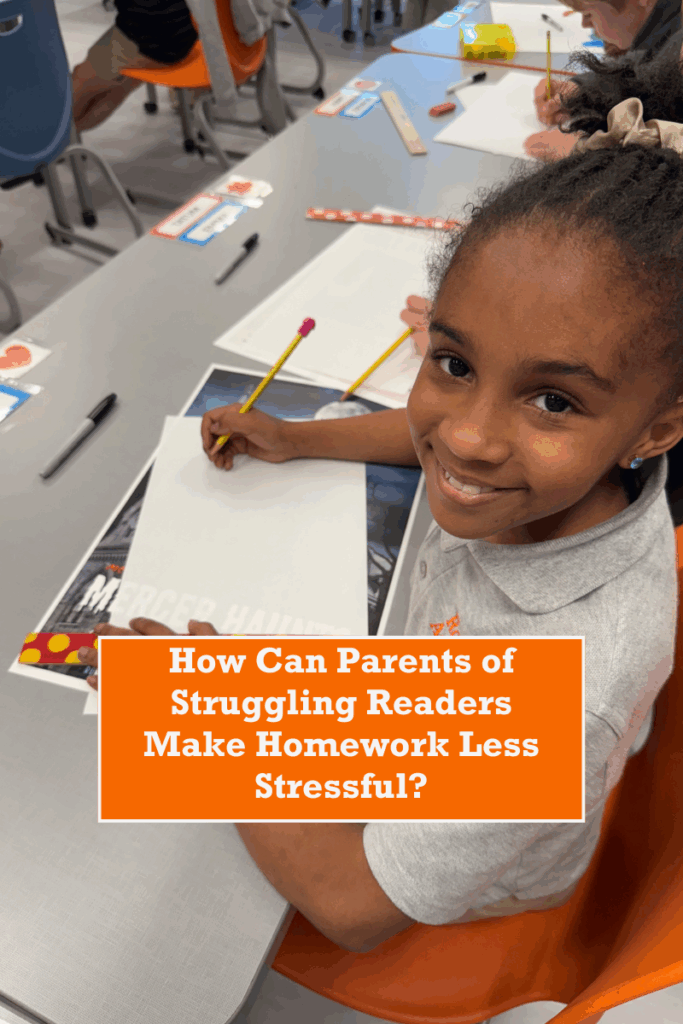For many families, homework can be a daily source of stress. But for parents of struggling readers, that stress can be magnified. What may take a typical student 20 minutes might take a dyslexic child an hour, resulting in tears, frustration, and self-doubt. The good news? With the right support and strategies, homework time can become more manageable and even empowering.
Here are 7 practical ways parents can reduce the stress of homework for dyslexic learners 👇

Dyslexic students and kids with reading difficulties often thrive on structure. Establish a set time and quiet space for homework each day. Keep distractions to a minimum (no TV or noisy siblings) and have supplies nearby. Predictability helps reduce anxiety and keeps your child mentally prepared for the task ahead.
Tip: Use visual schedules or checklists to help your child know what to expect. A sense of control helps lower stress levels.
Large assignments can feel overwhelming. Help your child tackle homework in bite-sized pieces. If a worksheet has 20 problems, try completing five at a time with short breaks in between.
Tip: Use a timer to create “focus sprints” (e.g., 10 minutes of work followed by a 3-minute break). This can make homework feel more manageable and less draining.
It’s tempting to hover or jump in when your child struggles, but it’s more helpful to coach them toward independence. Encourage effort over perfection, and celebrate small victories.
Say this: “I can see how hard you’re working. That matters more to me than getting every answer right.”
If homework takes more time than it should, communicate with your child’s teacher. Many educators are willing to adjust expectations for dyslexic learners, such as:
Tip: Keep a log of how long assignments take and share it during parent-teacher conferences.
Reading practice is important, but it shouldn’t feel like a punishment. Let your child read high-interest books—even if they’re below grade level—and offer audiobooks or partner reading as alternatives.
Remember: Confidence is built through success, not struggle.
When homework feels hard, dyslexic children may experience intense frustration. Help them learn calming techniques like deep breathing, stretching, or taking a quick walk. Remind them that mistakes are part of learning and that their brain works differently.
Homework doesn’t define your child. Make space in your evening to celebrate what they can do—whether that’s building Legos, telling creative stories, or solving puzzles. A strengths-based mindset can go a long way in balancing the emotional toll of academic tasks.
Why is your child struggling to read? They might have dyslexia.
Many parents first notice signs of dyslexia during homework time, when reading, writing, or spelling tasks seem unusually difficult or frustrating for their child.
Common signs of dyslexia include trouble sounding out words, frequent guessing when reading, poor spelling, slow or laborious reading, and difficulty remembering sequences like days of the week or steps in a process.
Children with dyslexia may also avoid reading aloud or become anxious when asked to complete written work. These struggles are not a reflection of intelligence; dyslexia is a language-based learning difference that affects how the brain processes written language.
Early identification is key, so if you recognize these signs in your child, consider reaching out to their teacher or a specialist for support and evaluation.
At Roberts Academy, we understand the unique needs of dyslexic learners, and we believe that homework should never be a source of unnecessary stress. Our homework policy is intentionally designed to support student well-being and reinforce classroom learning without overwhelming families.
When homework is assigned, it is minimal, meaningful, and directly connected to what students have already learned during the school day. This light reinforcement helps build confidence and retention while leaving time for rest, family connection, and after-school interests.
We believe that home should be a place where learning continues naturally, not through long hours of work, but through encouragement, curiosity, and joy.
Roberts Academy is Georgia’s only school for dyslexic students outside of Metro Atlanta; it’s also the most affordable school of its kind in the state.
Serving students in grades 2-6, the Academy uses the Orton-Gillingham Approach – an evidence-based way of teaching designed specifically for students with dyslexia.
Want to learn more? Visit our website or schedule a tour.
Discover Roberts Academy at Mercer University in Macon, Georgia!